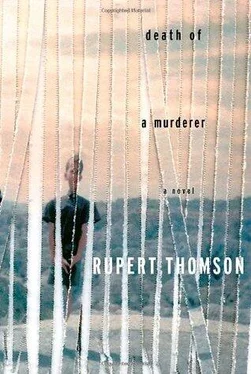“You would’ve thought she was normal,” he said.
“Normal. Yes.” Eileen seemed surprised that he had been able to assist her. Grateful too. But then she took a step backwards, and one of her hands shot out in front of her, the fingers spread, as though she were trying to keep something at bay. Her other hand had risen towards her face.
“Eileen?” Billy said. “Are you OK?”
She waved at him with the hand that was sticking out, but didn’t look at him, the rest of her body rigid, braced, quite motionless. Then she sneezed four times, in rapid succession.
“Bless you,” Billy said.
She took out a tissue and blew her nose. “I don’t know what came over me,” she said.
“Maybe it’s cold in here — colder than the rest of the hospital, anyhow.”
“Yes,” she said, turning towards the door, “that’s probably it.”
Though his observation might well have been true, he had the odd feeling that he was covering for her — or even, perhaps, for both of them. Equally oddly, she appeared to be colluding with him. There was the sense, for a few short moments, that they had found themselves in a dangerous predicament, and that, if they had survived, it was only because they had, at some level, joined forces and because they had stood firm.
He stooped over the scene log.
“You won’t tell anyone, will you?” he said. “About me getting — you know…”
She was sideways-on to him, by the door. “I don’t think there’s any need, do you?”
In sounding offhand, and choosing not to look at him when she spoke, she had allowed him to save face, and he liked her immensely for that.
He saw her out, then glanced at his watch. Thirteen minutes to go.
“So what’s it like?”
Virus Malone stood just inside the mortuary with his hands in his pockets, rocking slightly on his heels.
“There’s a ghost,” Billy said.
Virus looked at Billy placidly, as if it was only a matter of time before he retracted his statement.
“When she appears,” Billy said, “keep calm. She’ll try and talk to you. Don’t answer. Oh, and tell her she’s not allowed to smoke. No smoking in the mortuary. It’s against regulations.”
“Same old Billy.” Virus shook his head.
Though the two men had worked together in the mid-nineties, Virus had been transferred to the other side of the county just before the millennium, and they hadn’t seen each other in quite a while.
“So how’s Newmarket?”
“The racing’s good — and, you know, it’s a bit quieter. You’re not there, for a start…” Looking at the floor, Virus grinned and rubbed the back of his neck — for some reason, making jokes had always embarrassed him — then his eyes travelled round the room again. “So what’s it been like,” he said, “really?”
“All you do is sit here,” Billy said. “Time goes pretty slowly.”
Virus nodded. Now, finally, he had a framework within which he could function.
Billy signed himself out, then handed the pen to Virus and watched as he began to record the fact that he had taken over as scene loggist. I am Police Constable James Malone… His writing was unexpectedly small and tidy, and the letters all leaned forwards, like people walking into the teeth of a gale. Billy hoisted his bag on to his shoulder. At the door, he turned and said, “Careful you don’t catch anything.”
Virus gave Billy the finger, but he was grinning.
Out in the corridor, the mood had altered. A new day had started, and nurses were hurrying this way and that. Some pushed trolleys or wheelchairs; others were carrying charts. The air smelt of breakfast — hospital breakfast: damp toast, stewed tea, watery scrambled eggs. Walking back to the main entrance, Billy felt ambivalent about having been relieved. On the one hand, he badly needed rest. Putting in a twelve-hour shift on very little sleep had left him veering between moments of great clarity and sudden bursts of panic and despair. He still couldn’t believe that he had broken down in front of Eileen Evans; he hoped to God it didn’t go any further. On the other hand, the operation wasn’t over yet, and he would be missing out by not being there. Though he knew his place — he was just a bobby, a cog in the machine — it would have been satisfying to be able to see it through. But perhaps that satisfaction wasn’t something he had worked for. In the end, perhaps, it wasn’t something he had earned.
From his various conversations with Phil Shaw, and with other personnel, in both the police and the hospital, he had learned a good deal about what would be happening that day. He knew that undertakers were being brought in from somewhere at least two hundred miles away — Sue had been spot on about the difficulty of finding a firm willing to handle the body — and that they were scheduled to arrive at five o’clock that afternoon. While the body was being transferred from the fridge to the coffin, with Phil looking on, police vehicles would be moving into position outside. The crematorium being used was situated to the north-west of Cambridge, near the junction of the A14 and the M11. It was a good twenty miles from the hospital, in other words, and traffic would have to be controlled for the entire length of the route. The journey would take about forty minutes. At no point would the hearse be stationary.
The funeral was due to take place at seven-thirty, after the crematorium had closed. About a dozen people were expected to attend the short service. Owing to illness, the woman’s mother would not be among them. The body would be cremated, and when the ashes had cooled they would be placed in an urn. Once again, the sergeant would be on hand to oversee every stage of the process.
Towards eleven, he would leave the crematorium in an unmarked car, the urn in his possession. Hopefully, any journalists or members of the general public would have dispersed by then; a raw, cold night was forecast, with the possibility of rain, and it was unlikely anyone would want to hang around in that kind of weather. The sergeant would be driven to a secret location where he would surrender the ashes to an unidentified third party. The moment the ashes left his hands, his job — and the job of the police — would be over.
On reaching the cafeteria, Billy stopped and looked in, hoping to say goodbye to Mr. Prabhu and wish him well, but he wasn’t there. He would be having a word with the medical staff, or maybe he, too, had gone home to get some sleep. Moving on again, Billy nodded at the two volunteers who were manning the reception desk, then he left the hospital.
He stood on the steps that led down to the car-park and breathed the damp, leafy air. It was still dark. To the north, white smoke was rising from the sugar factory. He knew much of what the day would hold for the police, but there were still questions, weren’t there? Who was the unidentified third party, for instance? And who would decide where the woman’s remains were scattered? Which piece of land would be considered neutral enough, or resilient enough, to become her symbolic resting place? Or would she be scattered over water? And would that be the end of it? Would people finally forget? Forgive? Billy didn’t know the answers to any of these questions. All he could do was speculate. He remembered how the ash from the woman’s cigarette had fallen soundlessly into the drain, and how, later, he had examined the metal grille and been unable to find any trace of it, not so much as a single grey-white flake. Perhaps that was how it would be. Not rest exactly, but disappearance. Not peace, but silence.
Once back in his car, Billy checked his mobile — no new messages — then put it on the passenger seat and turned the key in the ignition. Though it was cold, he decided not to use the heater; it would only make him drowsy. If he drove fast and the traffic was light, he could be parked by the estuary in time to see the river change colour — though there wasn’t much colour involved, not in November. The water just gradually made its presence felt: from black to charcoal-grey, or steel-grey, or even, sometimes, silver — like looking at a glass-topped table in a darkened room. But he hadn’t forgotten his promise to have breakfast with Sue. He wouldn’t stay for more than a few minutes.
Читать дальше












